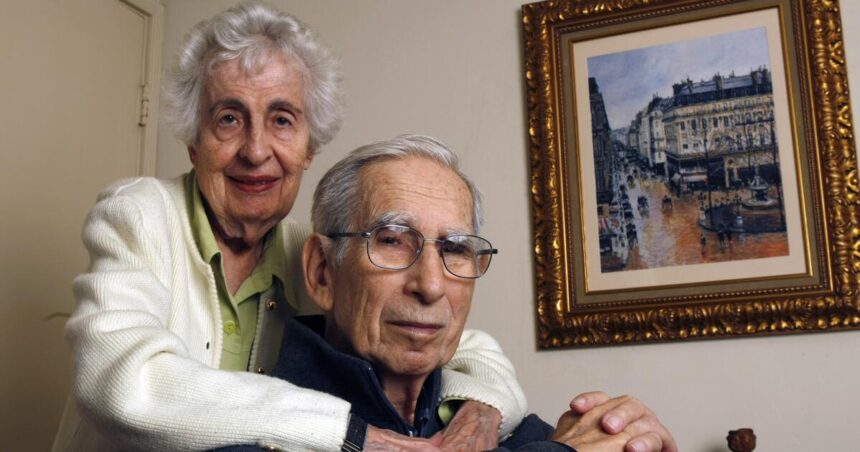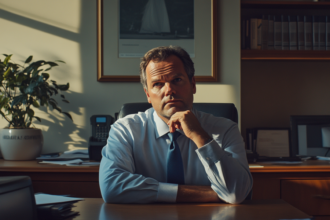The California Legislature defied one of the nation’s most powerful federal courts by enacting a new state law aimed at reuniting Jewish families at the dawn of World War II.
The law, signed by Gov. Gavin Newsom on Monday and effective immediately, was presented to the U.S. 9th Circuit Court of Appeals, which ruled that Camille Pissarro’s painting “Rue Saint-Honoré in the Afternoon. Effect of Rain” is legally owned by a Spanish museum and does not have to be returned to the American descendants of Lily Cassirer-Neubauer, who handed the masterpiece over to the Nazis in 1939 to obtain a visa to flee Germany.
The passage of this law, after nearly two decades of legal battles, sets the stage for the family to renew their final efforts to recover the masterpiece, estimated to be worth tens of millions of dollars. California law makes clear that not only Nazi-looted art like the Pissarro, but also other valuables stolen during past or future genocides or political persecutions must be returned to their rightful owners.
“For Holocaust survivors and their families, the fight to regain ownership of art and other personal items stolen by the Nazis continues to be traumatic for people who have already suffered unimaginable hardship,” Governor Newsom said in a statement. “It is both a moral and legal imperative to return these priceless and memorable items to their rightful owners, and I am proud to strengthen California’s laws to help bring justice to these families.”
Governor Newsom signed the bill during a small gathering with family members of Holocaust survivors at the Holocaust Museum in Los Angeles. Neubauer’s great-grandson, David Cassirer of Colorado, attended the rally and praised Governor Newsom and the bill’s authors, including Rep. Jesse Gabriel (D-Encino), co-chair of the California Legislative Jewish Caucus, for “taking a clear stand in support of the true owners of stolen art.”
Cassirer said his late father, Claude Cassirer, who discovered the Pissarro painting had survived the war and began the family’s fight for its return 20 years ago, would be ecstatic about the support from his adopted state.
“As a Holocaust survivor, the proudest day of my father’s life was the day he became a United States citizen in 1947,” Cassirer said. “I know he would be pleased and grateful that the people of California have taken action to return looted art to its rightful owners.”
Thaddeus Stauber, a lawyer for Madrid’s Thyssen-Bornemisza National Museum, which owns Pissarro’s works, said late Monday he was not immediately available to comment.
The new law is far-reaching in the sense that it sets out clear standards for how claims for looted art should be treated under California law, providing American families who have suffered political persecution in the past, present, or future with a clearer path to recover such art.
But it is also extremely accurate in its application to the Cassirer case on which it is based and to which it refers.
Neubauer searched for the painting for years after the war but was never able to find it, and he died without ever knowing whether it had survived the war.
Forty years later, in the early 2000s, her grandson, Claude Cassirer, discovered that the painting she had entrusted to him had survived and was part of the vast collection of the Thyssen-Bornemisza National Museum, a prominent art museum owned by the Kingdom of Spain.
When Claude Cassirer asked for the painting’s return but the museum refused, he filed suit in US federal court.
In January, a three-judge panel of the 9th Circuit Court of Appeals ruled that the nature of the dispute required the application of an older Spanish law that recognizes that ownership of stolen property transfers over time, justifying the museum’s acquisition of the paintings, rather than California’s modern law, which complies with international agreements that require Nazi-looted art to be returned to its rightful owners.
One of the judges on the commission, appointed outright by President George W. Bush, said he agreed with the ruling even though it went against his “moral views.” A larger group of judges reviewed the ruling, and a smaller group of judges overruled it, though some found it had misapplied the law.
With the new law in place, California lawmakers made it clear they believed the court had misinterpreted state law, and the text of the new law explicitly states that it applies to Cassirer’s case and should change the outcome.
Sam Dubin, the Cassirers’ longtime lawyer, said the family plans to formally challenge the 9th Circuit’s decision, including citing the new law, which he called a “clear line” that “prevents museums in possession of stolen art from delaying or distorting when truth and justice are readily within reach.”
“This new law is essential for truth, history, justice, the Cassirer family, and future litigation,” Dubin said. It’s not yet clear what form the family’s lawsuit will take, or in which court.
The lengthy legal battle has significantly increased the profile, and perhaps the value, of the Pissarro painting itself, and may set a useful precedent for other families seeking the return of looted art. Lawyers, art historians and others involved in such litigation around the world have been closely following the Cassirer case.
Gabriel said the state’s new law aims to protect all victims of genocide, persecution and political plunder.
“Our efforts will make it abundantly clear that California law must prevail over foreign laws, that California stands with Holocaust survivors, and that cases must be tried on the basis of truth, justice and morality, not the misapplication of legal technicalities,” he said.
David Schechter, president of the United States Holocaust Survivors Foundation, said Holocaust survivors and their families are “extremely grateful” that Governors Gabriel, Newsom and other lawmakers passed the new bill.
“The looting of art and other property from Jewish families was a key part of Hitler’s plan to annihilate the Jewish people and erase all vestiges of Jewish life and culture. Spain’s insistence on continuing to keep the Cassirer family’s Pissarro paintings perpetuates the crimes of the Nazi regime and denigrates the memory of six million Jewish souls,” Schachter said.
“Californians should be proud that their lawmakers will not allow this to happen.”









